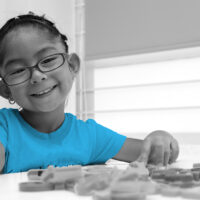Adolescents
-

Self-harm E-learning for School Staff: Co-production of the SORTS Toolkit
Self-harm among adolescents is increasing in prevalence and there is a lack of evidence-based, whole-school approaches to support students and staff with their response to self-harm. This blog discusses the need for a whole-school approach to self-harm training in schools alongside the SORTS study, which used co-production methods to develop the Supportive Response to Self-Harm in Schools (SORTS) toolkit.
Read more -

Unfolding Autism; An International Expert Conference
Don’t miss the Early Bird! This conference brings together four leading experts to explore distinct yet interconnected topics: early detection, co-occurring mental health challenges, participatory approaches, and evidence-based supports for adolescents and young adults. With a focus on practical tools, emerging models, and inclusive innovation, this conference is essential for professionals working to improve outcomes for autistic children, teens, and their families.
- Event type
- International Expert Conference
- Location
- LIVE STREAM
-

Interventions for Sibling Mental Health Conditions: New Systematic Review Shows Lack of Evidence
This blog offers a summary of the findings and implications of a recent systematic review of studies looking at the effectiveness of interventions for young people with sibling mental health conditions. Only four papers were included in this review, highlighting the lack of evaluations for interventions supporting these young people.
Read more -

Using digital tools to identify, track and support the psychological needs of children – an introduction to BERRI
An introduction to BERRI and some insights from analysing the BERRI data from 15,000 uses with children in care, delivered by Dr. Miriam Silver.
- Event type
- Talk with Q&A
- Location
- LIVE STREAM
-

Shore: a safe place for young people worried about sexual behaviour
Children and young people engaging in harmful sexual behaviour is a national public health issue, affecting thousands of young people across the UK every year. Despite this, there are few services available to support young people once harm has taken place and even fewer for young people concerned about their own or someone else’s sexual thoughts, feelings or behaviour.
- Event type
- Talk with Q&A
- Location
- LIVE STREAM
-

International Women’s Day #AccelerateAction: Accelerating gender equality in psychological research and psychiatry
On March 8th, 2025, the world is celebrating the 104th International Women’s Day, a tradition that began in 1911. This year’s International Women’s Day focuses on the theme of “Accelerate Action”, which highlights the urgency for dismantling systematic barriers that hinder women’s full participation in various research fields – including psychology and psychiatry.
Read more -

Call for papers – JCPP Advances Special Issue 2026 “Transdiagnostic Approaches to Child and Adolescent Mental Health”
JCPP Advances invites manuscripts for a special issue entitled “Transdiagnostic Approaches to Child and Adolescent Mental Health”. Interested authors should submit a letter of intent as a Microsoft Word document to the JCPP Advances editorial office with ‘JCPPA Special Issue 2026’ in the subject line by 28th March 2025.
Read more -
 12
12
Protected: Beyond Words – An exploration of the mental health of children and young people with severe and profound learning disabilities
There is no excerpt because this is a protected post.
- Location
- Edinburgh
-

Eating Disorders: A Concern for All
Did you know that approximately 22% of children and adolescents worldwide show disordered eating? Eating Disorders Awareness Week (24 February – 2 March 2025) is an opportunity to improve awareness that anyone can have an eating disorder and explore the impact that eating disorders can have on children and young people.
This Eating Disorder Awareness Week, we encourage you to explore the FREE learning opportunities available on our website and ACAMH Learn, and to share with your networks.
Read more -

Early Intervention in Mental Health and Intellectual Disabilities – This is how we do it in Dorset
The theme of this event is service innovation and delivery. We will showcase two excellent initiatives/areas of good practice within Dorset Healthcare involving our trailblazers Mental Health Support Team (MHST) and specialist Pan Dorset Intellectual Disability CAMHS.
- Event type
- Half day conference
- Location
- LIVE STREAM